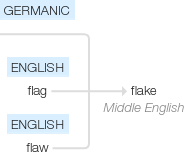Flake
Middle English: the immediate source is unknown, the senses perhaps deriving from different words; probably of Germanic origin and related to flag2 and flaw1.
wiktionary
From Middle English flake(“a flake of snow”), from Old English flacca and/or Old Norse flak(“loose or torn piece”) (compare Old Norse flakna(“to flake or chip”)), from Proto-Germanic *flaką(“something flat”), from Proto-Indo-European *pleh₂-(“flat, broad, plain”). Cognate with Norwegian flak(“slice, sliver”, literally “piece torn off”), Swedish flak(“a thin slice”), Danish flage(“flake”), German Flocke(“flake”), Dutch vlak(“smooth surface, plain”) and vlok(“flake”), Latin plaga(“flat surface, district, region”). Doublet of plage.
A name given to dogfish to improve its marketability as a food, perhaps from etymology 1.
Compare Icelandic flaki?, fleki?, Danish flage, Dutch vlaak.
etymonline
flake (n.)
"thin flat piece of snow; a particle," early 14c., also flauke, flagge, which is of uncertain origin, possibly from Old English *flacca "flakes of snow," or from cognate Old Norse flak "flat piece," from Proto-Germanic *flakaz (source also of Middle Dutch vlac, Dutch vlak "flat, level," Middle High German vlach, German Flocke "flake"); from PIE root *plak- (1) "to be flat." From late 14c. as "a speck, a spot."
flake (v.)
early 15c., flaken, (of snow) "to fall in flakes," from flake (n.). Transitive meaning "break or peel off in flakes" is from 1620s; intransitive sense of "to come off in flakes" is from 1759. . Related: Flaked; flaking.
